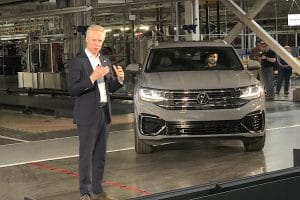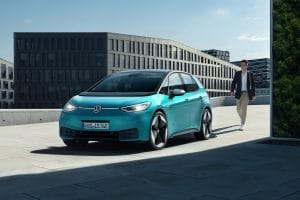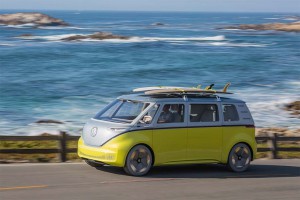
VW Group of America CEO Scott Keogh introduces the new Atlas Cross Sport, one of at least three new SUVs in the automaker’s pipeline.
Few brands had the “cool” factor of Volkswagen back in the 1960s, when products like the Beetle and the Microbus won over millions of American buyers, young and old.
The German automaker is hoping to rebuild its hip brand identity – while moving past the “god-awful stupid mistake” it made by rigging its diesel engines – with an array of new SUVs and BEVs set to roll out during the next several years, Volkswagen Group of America CEO Scott Keogh told TheDetroitBureau.com.
While it’s far too early to tell how battery-electric vehicles like the ID Buzz microvan will fare in the market, there are signs that VW is regaining some of its luster. The automaker has defied the overall downturn in the U.S. market this year largely due to its expanding line-up of utility vehicles.
(First Look: 2020 Volkswagen Atlas Cross Sport)
Just three years ago, the older Touareg and Tiguan models accounted for a mere 14% of Volkswagen brand sales in the States. This year, the SUV share surged to 52%, Keogh said during a discussion at the Volkswagen plant in Chattanooga, Tennessee. And that’s likely not a high point, he added, following the debut of the automaker’s latest utility vehicle, a two-row version of the big Atlas dubbed the Sport Cross.
“This is a massive swing,” said Keogh, as the first of the new models rolled off the Chattanooga assembly line.
The Cross Sport is just one of an assortment of upcoming Volkswagen utility vehicles, Keogh said during the subsequent conversation. He confirmed at least two more will follow, including a base model notably smaller than the current Tiguan, suggesting there is “a massive opportunity for SUVs in the A-segment.”
Yet another SUV, sized somewhere between that entry model and the Tiguan is also in the works.
VW unveiled the production version of its first long-range battery-electric, dubbed the ID.3, at the Frankfurt Motor Show a month ago. That hatchback won’t come to the U.S., but a crossover using the same, new all-electric platform will become the first BEV to charge into American showrooms.
“We will be showing that off sometime in February (2020) and it will be retailed starting at the very end of the 2020 model-year,” Keogh said, adding that it will get some variation of the “ID” nameplate that future all-electric Volkswagen products will get in Europe and other global markets.
Initially, the electric utility vehicle will be produced abroad but “then we will manufacture it here … sometime in calendar-year 2022,” said Keogh, noting that it will be the first of at least two all-electric products to be assembled at the Chattanooga plant once an $800 million expansion is completed.

The ID.3 is the first production model off VW’s new MEB all-electric architecture, but it won’t come to the U.S.
The automaker has not said much about the other product except to note that it will share the same underlying modular architecture as the ID.3 and ID crossover. Dubbed the MEB, it will underpin the majority of the future battery-electric vehicles coming from the various Volkswagen Group brands in the years ahead.
(De Nysschen Returns! Named Volkswagen’s North American COO)
That includes the production version of the ID Buzz, a wildly popular concept vehicle meant to bring back the old Volkswagen Microbus in modern form.
There have been some concerns that the project was running behind schedule but, “That car is on track,” Keogh said. “It will launch in Europe in 2022, but we’ll have to do some localization before it comes here.”
Volkswagen faces a number of challenges, among them a perception that its products are more costly than those from U.S. and Asian rivals. But Keogh said he believes that VW’s all-in commitment to electric vehicles – an investment running over $12 billion – will ensure the economies of scale that actually will help it undercut its competition.
“Let’s not use the word, cheap,” he said, when asked how low its electric models will go. The better word for the electric crossover, he added, will be “Affordable. Right now, $33,000 or somewhere around there. I think that’s the center of the market.”

Porsche’s Taycan is one of numerous electric vehicles that will be marketed through other VW brands, a total of about 50 BEVs due by 2025.
There are other challenges that VW has to face down, Keogh added. Among other things, that includes the “god-awful stupid mistake” of cheating on diesel emissions standards. The scandal may have broken four years ago but. Keogh acknowledged, “There are customers who were wronged who are not going to forget it too quickly.”
The best VW can do, he stressed, is to show it is a better company, one making better products. And he is hoping that the marque’s SUVs will be a case in point. While Keogh said it remained a matter of debate how big the battery-car market will be, “I think this is a new opportunity Volkswagen can take advantage of because it’s the one time where we can leverage our global scale to get some competitive pricing,” while also delivering a mix of style, performance and other characteristics that will harken back to the “magic moment back in the ‘60s.”
(Volkswagen Gets a New Look — and a New Sound)
With products like the Beetle and the Microbus, he said, “we provided transportation for the millions (in the U.S.). We had a heck of a cool car that caught the zeitgeist of America. I think we have that opportunity with our electric models to be the brand that introduces a cool car at a cool price.”

